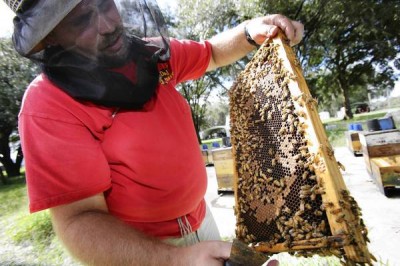
image credit articles.orlandosentinel.com
Beekeepers and citrus growers in Florida are butting heads over the use of pesticides.
The reason: The increased usage of pesticides may be contributing to millions of bee deaths each year. Citrus growers, though, say they need the pesticides to fight “citrus greening,” a fatal crop bacteria.
Citrus is the largest agricultural commodity in the state, and beekeepers make up just a small portion of the same industry there. One Florida citrus grower was recently fined for killing millions of honeybees after illegally spraying pesticides.
Florida Agriculture Commissioner and fellow citrus grower Adam Putnam is hopeful that both groups can work together with scientists and come up with a solution to the citrus greening and bee danger problem. He addressed the issue to a packed room during a recent meeting of the Citrus Research and Education Center meeting in Lake Alfred.
Andy Rackley, director of the Division of Agricultural Environmental Services at the Department of Agriculture and Consumer Services, urged both sides to work together and not rely on government involvement.
“Inevitably, political science gets involved in this,” Rackley said. “It’s not in our interests to let this become a political issue. The eyes of regulatory agencies on a national basis are watching us. It’s going to require some sacrifices.”
Said Adam Putnam, “The two industries absolutely depend on one another. Rest assured this is a high priority for us. We can work this through.”
Citrus-flavored honey is one of the more popular honeys in the region.
The agency Andy Rackley represents is the organization which levied the $1,500 fine against Frostproof’s Ben Hill Griffin Incorporated for the illegal pesticide spraying. The agriculture report states that Montana 2F was applied to the roots of young citrus trees in a 50-acre grove. The active ingredient in the chemical pesticide is imidacloprid – a neonicotinoid.
Opponents to the use of chemical pesticides were quick to point out that the fine was far less than the $10,000 per incident maximum. Beekeepers impacted by the illegal spraying reportedly lost $240,000 in revenue, and the world lost about 1 million more bees. Colony collapse disorder has plagued the honeybee population worldwide for at least the last eight years.
Rackley joked that officials in Washington, DC can’t even seem to work together to pass a Mother’s Day resolution. But he said folks in Florida are good at solving problems. He also stated that enhanced communication between the citrus growers and beekeepers before grove-spraying occurs would greatly aid in averting bee deaths.
In the past, Florida citrus growers primarily used biological controls to keep crops healthy. Citrus friendly insects which are natural predators to harmful pests were most often the go-to method for the industry. But that all changed when citrus greening became a major problem.
Biological methods have not been effective against the greening bacteria caused by the Asian citrus psyllid – the insect that plays host to the wicked bacteria. The heated tensions between citrus growers and beekeepers began in 2005 when the greening bacteria infected approximately 75 percent of the crop producing trees in the state.
The greening issue has spread across Florida consistently since it first appeared – prompting more and more chemical pesticide spraying – and dead bees. In recent years, citrus growers’ enhanced spraying grew from two to four times a year before greening season to as much as monthly in 2013. The Asian citrus psyllid may be developing a resistance to the pesticides — just like weeds have in western and northern farms.
During the citrus bloom season beekeepers frequently put hives either near or in citrus groves so that the pollinators can make citrus-flavored honey. The nearness of the bee hives during the pesticide spraying puts them right on the front line.
Many beekeepers are naturally worried that continuing the long-standing and mutually beneficial practice will further put their hives at risk.
“The days of putting bees right in the middle of a grove, I think those days are gone,” said Bell Apiraries LLC representative Bobbi Bell. “Since honeybees are capable of foraging more than 79-square-miles from their hives, it will be virtually impossible to prevent them for coming in contact with pesticide-laden citrus groves.”
The Florida Agriculture Department is going high-tech to help save the bees and citrus commodities. A new computer application focuses on keeping both beekeepers and growers in the know about hive locations and pesticide spraying in in the works. In the past, some beekeepers have bristled at the idea of sharing specific hive locations with competitors.
As previously reported by Off The Grid News, neonicotinoids have been frequently blamed for mass deaths of bees.
 Off The Grid News Better Ideas For Off The Grid Living
Off The Grid News Better Ideas For Off The Grid Living




